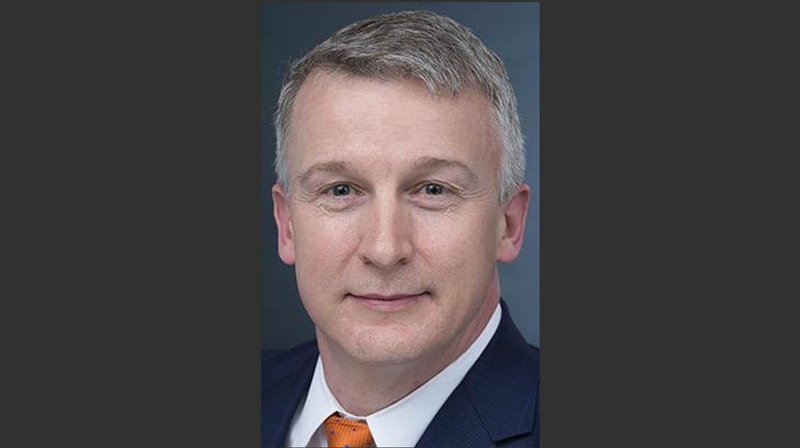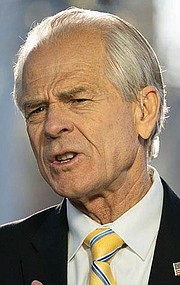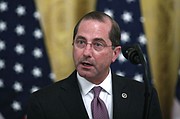WASHINGTON -- The Trump administration failed to prepare for the onslaught of the coronavirus, then sought a quick fix by trying to rush an unproven drug to patients, a senior government scientist alleged in a whistleblower complaint Tuesday.
Dr. Rick Bright, former director of the Biomedical Advanced Research and Development Authority, alleges he was reassigned to a lesser role because he resisted political pressure to allow widespread use of hydroxychloroquine, a malaria drug touted by President Donald Trump. He said the Trump administration wanted to "flood" hot spots in New York and New Jersey with the drug.
"I witnessed government leadership rushing blindly into a potentially dangerous situation by bringing in a non-FDA approved chloroquine from Pakistan and India, from facilities that had never been approved by the FDA," Bright said Tuesday on a call with reporters. "Their eagerness to push blindly forward without sufficient data to put this drug into the hands of Americans was alarming to me and my fellow scientists."
Bright filed the 89-page complaint with the Office of Special Counsel, a government agency that investigates retaliation against federal employees who uncover problems. He wants his job back and a full investigation.
The Department of Health and Human Services issued a statement saying that Bright was transferred to the National Institutes of Health to work on coronavirus testing.
"Dr. Bright was transferred to NIH to work on diagnostics testing -- critical to combating covid-19 -- where he has been entrusted to spend upwards of $1 billion to advance that effort," said Health and Human Services Department spokeswoman Caitlin Oakley. "We are deeply disappointed that he has not shown up to work on behalf of the American people and lead on this critical endeavor."
According to the agency, Bright has not reported to his new post. But his spokeswoman said that Bright is on sick leave, following his doctor's orders, and that the Health and Human Services Department has provided him no details on his new role.
Bright's complaint comes as the Trump administration faces criticism over its response to the pandemic, including testing and supplies of ventilators, masks and other equipment to stem the spread. There have been nearly 1.2 million confirmed cases in the United States and more than 71,000 deaths.
Bright said his superiors repeatedly rejected his warnings that the virus would spread in the U.S., missing an early opportunity to stock up on protective masks for first responders. He said he "acted with urgency" to address the growing spread of covid-19 -- the disease the virus causes -- after the World Health Organization issued a warning in January.
LAWMAKERS RESPOND
Rep. Anna Eshoo, D-Calif., chairwoman of the House Energy and Commerce subcommittee on health, said she plans to hold a hearing into his complaint next week, and Bright's lawyers said he would testify. House Speaker Nancy Pelosi, appearing on MSNBC, called the complaint "very damaging."
In his complaint, Bright said he "encountered resistance from HHS leadership, including Secretary [Alex] Azar, who appeared intent on downplaying this catastrophic event."
According to the whistleblower complaint, during a Feb. 23 meeting, Azar, as well as Bright's boss, Assistant Secretary for Preparedness and Response Robert Kadlec, "responded with surprise at [Bright's] dire predictions and urgency, and asserted that the United States would be able to contain the virus and keep it out."
Bright also says he raised repeated objections to the "outsized" role Kadlec allowed industry consultants to play in securing contracts for drugs that Bright and other scientists viewed as "not meritorious."
One of those mentioned was John Clerici, a pharmaceutical consultant with ties to Kadlec. Bright said he was pressured to extend a contract with one of Clerici's clients.
Clerici, in a statement, said he "unequivocally" denied the allegations by Bright. He added, "It's sad that during this crisis Dr. Bright and his team have chosen to launch politically motivated allegations against me and other people. The allegations are false and will be proven so."
Bright said White House trade adviser Peter Navarro was a rare exception among administration officials, extremely concerned about the potential consequences of an outbreak. He described working with Navarro to break a bureaucratic logjam and set up military transport from Italy for swabs needed in the U.S.
Navarro was the author of several urgent memos within the White House. Bright said Navarro asked for his help, saying the trade adviser told him the memos were needed to "save lives."
Bright's allegation that he was removed over his resistance to widespread use of the malaria drug was already public, but his whistleblower complaint added details from emails and internal communications while bringing to light his early attempts to acquire N95 respirator masks, which he said were ignored by superiors.
In late January, Bright said he was contacted by an official of a leading mask manufacturer about ramping up production. It was estimated that as many as 3.5 billion would be needed, while the national stockpile had about 300 million.
The complaint said that when Bright tried to press the issue about masks with superiors at Health and Human Services, he was ignored or rebuffed. "HHS publicly represented not only that COVID-19 was not an imminent threat, but also that HHS already had all the masks it would need," the complaint said.
During that time, a major U.S. manufacturer contacted Bright, offering to activate mothballed production lines, but Bright could not get traction with superiors to fund the effort, the complaint states.
Instead, sensing no urgency from the U.S., Prestige Ameritech proceeded to export a million masks to China, according to the complaint. Prestige Ameritech did not immediately respond to a request for comment.
FDA ALERT
As the epidemic spread in the U.S. and engulfed the New York metropolitan area, Bright alleges that political appointees at Health and Human Services tried to promote hydroxychloroquine "as a panacea." The officials also "demanded that New York and New Jersey be 'flooded' with these drugs, which were imported from factories in Pakistan and India that had not been inspected by the FDA," the complaint says.
Last month, the U.S. Food and Drug Administration warned doctors against prescribing the drug except in hospitals and research studies. In an alert, regulators flagged reports of sometimes fatal heart side effects among coronavirus patients taking hydroxychloroquine or the related drug chloroquine.
Bright felt officials had "refused to listen or take appropriate action to accurately inform the public" and spoke to a reporter about the drug. He said he had to tell the public about the lack of science backing up its use, despite the drug being pushed by the president at news briefings.
"As the death toll mounted exponentially each day, Dr. Bright concluded that he had a moral obligation to the American public, including those vulnerable as a result of illness from COVID-19, to protect it from drugs which he believed constituted a substantial and specific danger to public health and safety," the complaint says.
"I could not in good conscience ignore the scientific recommendations to limit access to those drugs under the direct care of a doctor and instead allow political ambition and timelines to override scientific judgment," Bright said on a call with reporters.
The document describes one such clash in mid-March after Bayer offered to donate 3 million chloroquine pills to the national stockpile.
In an email included as part of the exhibits of Bright's complaint, a Biomedical Advanced Research and Development Authority official wrote, "there are safety liabilities associated with the drug ... accepting the donation could send a signal that we are not concerned about the risk."
The official added: "I do not believe we should accept the donation [of chloroquine from Bayer] until we have an understanding on the clinical utility of the drug. Accepting the donation could lead to widespread use that is not supported by any clinical data."
The Bayer donation ultimately went forward. Bright received an "urgent directive" from Health and Human Services general counsel Bob Charrow to make the drug widely accessible, outside of hospital settings and without close physician supervision, according to the complaint.
But that raised safety alarms with certain FDA officials, according to the complaint. Janet Woodcock, director of the FDA's Center for Drug Evaluation and Research, urged Bright to request an emergency use authorization from the FDA that was far narrower than what Health and Human Services sought.
The authorization that was issued, which applies to chloroquine and hydroxychloroquine from the national stockpile, is limited to hospitalized patients with covid-19 who cannot participate in a clinical trial.
Bright acknowledged in the complaint that his concerns over the drug's safety led him to provide emails and information to a reporter working on a story about Bayer's donation to the national stockpile, which further exacerbated tensions with his bosses.
'A BIG PROBLEM'
On Jan. 20, according to the complaint, the WHO held an emergency call that was attended by many Health and Human Services officials, and WHO officials advised that "the outbreak is a big problem."
Trump has accused the U.N. agency of mismanaging and covering up the spread of the virus after it emerged in China. He has also said he wants to cut the WHO's funding.
On a call with reporters on Tuesday, Bright's lawyers, Debra Katz and Lisa Banks, are requesting that Health and Human Services reinstate him as Biomedical Advanced Research and Development Authority director while his complaint is investigated.
"Dr. Bright's removal from BARDA was retaliation, plain and simple," Katz said.
Officials at Health and Human Services who have spoken on the condition of anonymity have said that Bright's departure had been discussed for months because of dissatisfaction with his job performance. Yet a 2019 performance review obtained by The Washington Post showed Bright received high marks.
Bright is represented by the whistleblower attorneys retained by Christine Blasey Ford, who alleged that Supreme Court Justice Brett Kavanaugh sexually assaulted her when they were teenagers.
Zachary Kurz, a spokesman for the agency where Bright filed his complaint, said the office couldn't comment or confirm the status of open investigations.
Information for this article was contributed by Ricardo Alonso-Zaldivar, Michael Balsamo and Colleen Long of The Associated Press; and by Yasmeen Abutaleb, Laurie McGinley, Aaron Davis and Ellen Nakashima of The Washington Post.
A Section on 05/06/2020


